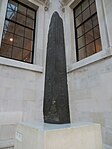King's Library
AC with 0 elementsBritish Library collectionsBritish MuseumDonations from the Royal CollectionUse British English from August 2015

The King's Library was one of the most important collections of books and pamphlets of the Age of Enlightenment. Assembled by George III, this scholarly library of over 65,000 volumes was subsequently given to the British nation by George IV. It was housed in a specially built gallery in the British Museum from 1827 to 1997 and now forms part of the British Library. The term "King's Library" was until recently also used to refer to the gallery in the British Museum built for the collection, which is now called the "Enlightenment Gallery" and displays a wide range of objects relating to the Enlightenment.
Excerpt from the Wikipedia article King's Library (License: CC BY-SA 3.0, Authors, Images).King's Library
Great Russell Street, London Bloomsbury (London Borough of Camden)
Geographical coordinates (GPS) Address Nearby Places Show on map
Geographical coordinates (GPS)
| Latitude | Longitude |
|---|---|
| N 51.51958 ° | E -0.1263 ° |
Address
British Museum
Great Russell Street
WC1B 3DG London, Bloomsbury (London Borough of Camden)
England, United Kingdom
Open on Google Maps









